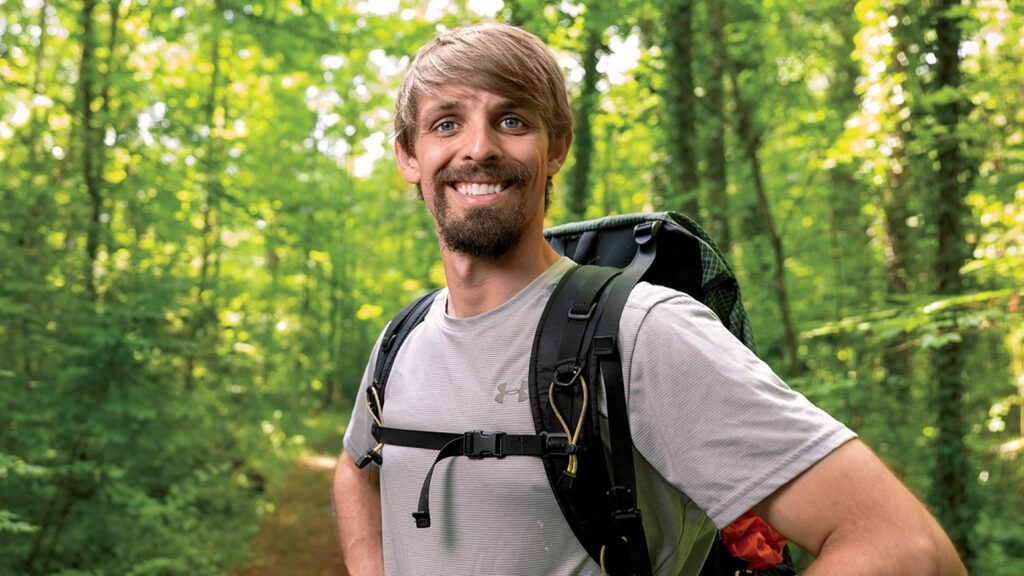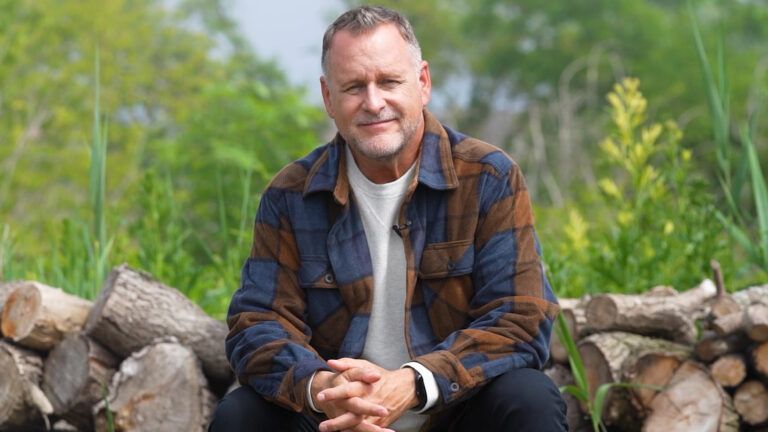Approaching the summit of Mount Katahdin, the highest point in Maine, I couldn’t believe my good fortune. Day One of my thru-hike of the Appalachian Trail and God was already blessing my hike with his powerful presence!
The hair on my arms stood up. I felt an electric charge in the air. I could see the sign marking the summit. I was starting at the northern terminus of the storied trail, and this was my first day’s goal. Was this what folks mean when they talk about “trail magic”?
Then I looked up and saw a massive thunderhead directly above the summit. The wind picked up, and the electricity in the air intensified.
I wasn’t having a direct encounter with God! This wasn’t trail magic! I was blundering into a thunderstorm atop an exposed peak. A mistake only a rookie hiker would make.
A rookie hiker like me.
Next minute, I was engulfed. Hail pounded down. Stupidly, I ran to the summit, got a picture of myself with eyes closed against the elements and raced back down, nearly slipping on what had become an icy trail.
The only encounter with God I had that day was divine mercy shielding me from the lightning strike that my inexperience had exposed me to.
I reached the base of the mountain, where the trail wends toward its southern terminus, Springer Mountain in Georgia, almost 2,200 miles away, and said a ragged prayer of thanks.
I also thought, Matt, what have you gotten yourself into?
It was June of 2017. Not only was I thru-hiking the Appalachian Trail solo, but I was also doing so as an official United Methodist Church trail chaplain. Since 2013, the Holston Conference of the UMC has selected a member to travel the length of the trail, befriending hikers and bringing God’s love to a place where many people are on a spiritual as well as physical journey.
If you had met me four years earlier, you would never have predicted that one day I would embark on a challenging long-distance hike as a witness for Jesus. Not in your wildest dreams.
I was sitting in jail in Virginia for selling methamphetamines. I’d sold the drugs to support my opioid addiction. I’d been an alcoholic, drug addict and dealer for years.
My dad had abandoned my mom when she was pregnant with me. Mom was 19. She dropped out of college. My stepfather struggled with meth addiction, and there was lots of fighting and instability in our house.
I experimented with drugs and alcohol in high school. Experimented—who was I kidding? By graduation, I was a full-blown addict, the guy who got crazy drunk at parties to overcome shyness, then felt deeply ashamed the next day and drank more to blot it all out.
I got booted out of the Army after failing a drug test. Lost jobs. Totaled a brand-new car and broke my neck. The accident introduced pain pills to my menu of substances.
At last came the inevitable arrest and felony conviction. I detoxed in jail and, for the first time in years, experienced the world as a sober adult. I was 23.
A preacher came into the jail periodically to read from the Bible and deliver a sermon. Most of the inmates ignored him. I wasn’t particularly interested in what he was selling, but his sincerity was hard to ignore. I realized he was the first apparently good person I had encountered in years.
I wound up in a court-ordered treatment program, which was followed by a year of strict supervision. I took up running at the recommendation of a treatment counselor.
One day, I jogged past a small Methodist church. Remembering the jailhouse preacher, I started attending. Church was one of the few places my restricted license allowed me to drive.
Why did I keep going to that church? Why did I stay sober? The answer is simple. People welcomed me—a felon, a drug dealer, a guy who’d wrecked his life. On some level, those jailhouse sermons had gotten through to me.
I wanted more of that. Unlike alcohol or drugs, God actually filled my deep well of inner need. I wasn’t waiting around for the next fix. His presence was a constant.
I was baptized and started a 12-step program at the church. People kept telling me I should consider a call to ministry. I attended some conferences and shared my testimony at other churches.
At one conference, I saw a video about the Appalachian Trail chaplaincy. Poor guy, I thought, figuring some unlucky pastor got tasked with that ministry each year.
I’d added occasional hikes to my workout routine, and some friends got the mistaken impression I loved being in nature. My main experience with the great outdoors had been passing out on my way home from parties.“
“Matt, you should apply for this trail chaplaincy,” a friend urged.
You had to apply to torture yourself like that?
“You’ll meet people in our conference doing the interviews. Think about it.”
I did want to meet more people in the church. I figured I was such a newbie, I’d never get picked. I applied. A few months later, I was shaking hands with an enthusiastic interview panel and being told to start buying the gear I’d need.
With help from the church, I had almost eight months to prepare. By the time I blundered into that hail-storm on Katahdin, I was physically fit but still very inexperienced in the wilderness—and in ministry.
It was one thing to share my story in a 12-step group or at a church service. I couldn’t picture going up to a stranger and saying, “Hi, want to talk to an ex-junkie about Jesus?” I’d received training in practicing the ministry of presence—getting to know hikers and helping people in need. I planned to lean on that training and share the Gospels when asked.
The day after Katahdin, I set out through Maine’s 100-Mile Wilderness. I vowed to be more careful. And I realized that, no matter how nervous you feel, when you’re hiking, you have no choice but to put one foot in front of the other, a little like sobriety. Life becomes very simple when it’s one step at a time.
Everyone on the A.T. adopts a trail name—a nickname expressing something about you. Mine was Trigger, the name Willie Nelson gave his old, beat-up guitar. I’d beaten myself up pretty good as an addict. I prayed I had what it took to meet this responsibility.
In July, I pulled off the trail to resupply in Stratton, Maine. I ended up eating with other hikers at a hostel. A burly guy struck up a conversation. He was a retired Marine, hiking the trail north with his wife. Because of their early start, they were nearing the end.
“At first, I didn’t know why I was out here,” he said. “In the Smoky Mountains, I realized: I’m looking for a purpose. The military was always my purpose. Now I think I need something spiritual.” He eyed me.
“Cool,” I said, “I’m a United Methodist trail chaplain. The church sends one each year to meet hikers.”
He brightened. “You mean a church cares enough to send a minister to meet someone like me?’
“It’s what Jesus did,” I said.
He blinked back tears. “Thank you, man. I think I just found my answer.”
That was better than any electric charge in the air. This was more than trail magic. For the rest of the hike, I would stumble into many such conversations.
I met people grieving a loved one or wrestling with a big life transition. Many had endured struggles with addiction. They were encouraged to learn that a chaplain had shared that struggle. What I’d always thought of as my weakness turned out to be a ministerial strength.
Not everyone was happy when they learned I was a chaplain. One woman in New Hampshire pushed back.
“I’m Jewish,” she said.
“I’m not here to convert anyone,” I told her. “Just meet people where they are.”
She relaxed, and we discovered a shared love of the musician John Prine. We ended up singing a duet of his song “Angel from Montgomery.”
I hiked through bugs, rain, stifling heat, freezing cold. I got blisters and muscle aches. I was always dirty.
Many days I hiked alone. Each night, I crowded into a lean-to with other hikers to share food, sleeping space and stories.
I wended through New Hampshire’s granite peaks, the old hills of Massachusetts, the mid-Atlantic’s gentle landscapes (notorious for rocks, roots and mud) and the wooded heights of the Great Smoky Mountains.
The trail became its own world. The farther I hiked, the more I felt God was beside me, step by step, guiding my way as he had since I got sober.
Growing up in a chaotic household, I’d always assumed there was something wrong with me. I’d wasted years hiding my insecurities behind a fog of addiction. On the A.T., all I had was myself, the stuff in my pack and God. Life was reduced to its essence.
It was fall as I entered Georgia. The leaves were gone, and nights were frosty. I approached the trail’s end with mixed feelings. A crowd of church people, friends and family would be waiting. Thoughts of a warm bed and a burger were enticing.
I would miss the simplicity of the trail and my daily conversations with strangers. Maybe everyone was right. Maybe I was called to be a minister. I loved talking about God. And for the first time in my life, I’d achieved a big goal without messing up.
I walked the last days with a group of hikers I’d gotten to know. I reached Springer Mountain, surrounded by cheers and hugs. I signed the trail register, and that was it. I was done.
It was hard to convey my feelings. I was glad God knew what I couldn’t express. One foot in front of the other. God always at my side. Those were lessons I would take with me long after the hike was over.
I did go on to become a licensed Methodist minister. Now I help oversee the trail chaplaincy program. I’d love to do another big hike someday, maybe the Pacific Crest Trail.
For now, I minister on a more everyday trail. It’s a different kind of adventure. And like everything else with God, that’s more than enough.
For more inspiring stories, subscribe to Guideposts magazine.





